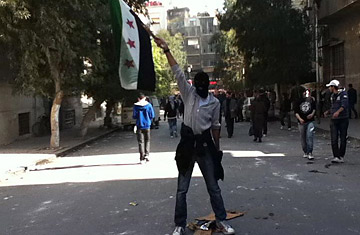
A Syrian protests against the country's President Bashar Assad in Damascus on Dec. 19, 2011
The memory still haunts Samar Yazbek. Five times this year, Syrian security police hauled the 41-year-old novelist, one of the country's best-known writers, from her home in Damascus and into detention centers — not in order to arrest her, she says, but to show her what she would suffer if she continued speaking out against President Bashar Assad's regime. In one detention cell, she saw two young men swaying unconscious, blood pouring from their faces, as they hung suspended from a ceiling; after witnessing another prisoner curled on the floor of a cell, she vomited and fainted. "I am still shocked and deeply sad, even today," she said on Tuesday, sipping an espresso at a café in Paris — about as stark a contrast as possible from the horrors she has witnessed. "The U.N. says 5,000 have been killed, but I am certain it is more," she says. "Many have disappeared, and those are not counted among the dead."
The number of those killed in Syria's 10-month revolt now looks set to rise. In a 100-minute speech at Damascus University on Tuesday, President Assad told a gathering of supporters that he would crush the rebellion with an "iron fist," no matter how far it spread. "Victory is near, because we are capable of being steadfast," Assad told the audience in a televised address interrupted several times with applause.
Well into the second hour of Assad's speech, Yazbek sank into a chair in the Left Bank café and let out a sign of despair, having not bothered to listen to it. "I foresee more and more bad coming from this man," she said. "The more the villages rebel, the more he will throw everything at people: the military, the secret police, all forms of repression, to kill the revolution."
For months last year, Yazbek joined the demonstrations in Damascus, where she says she watched people "carrying flowers and olive branches, and then getting killed." In The Smell of Cinnamon, a novel published four years before the revolution erupted, Yazbek already wrote that killers "walk the streets in cold blood," referring to government agents. Her next book, describing the current conflict, will appear in Arabic next month and in French and German in April. Having written several screenplays and four novels, Yazbek's writing was becoming increasingly antiregime, and with it, she says, the threat of arrest seemed ever more likely.
Rather than that possibility, or even the terrifying scenes of torture she saw in Syrian detention cells, her decision to flee the country came after the police threatened to arrest her daughter, now 18. "I could not work anymore, I could not write. And yet I could not hide and go underground because of my daughter," she says. "I would have stayed in hiding because I believe in the revolution," she says. "But with my daughter that was impossible."
On July 13 she and her daughter — whose name Yazbek does not want made public — made their way to Damascus Airport and boarded an Air France flight to Paris, landing just as the city was beginning its exuberant Bastille Day celebrations. Yazbek says she told just a few close friends that she was fleeing, fearing that if word spread, the police would grab her and her daughter as they tried to leave the country. She says she had to tell some people since she also feared that the two might disappear into custody, with no one knowing where they were.
As it was, Yazbek made it out of Syria — she hints that she received help from the French government — and requested political asylum on arrival at Charles de Gaulle Airport, joining a growing number of Syrians who have fled to France in recent months. They include Suhair Atassi, a well-known female blogger and political activist who fled to Paris late last year.
